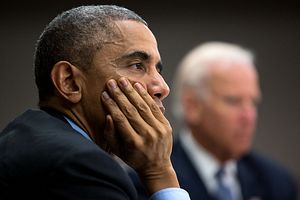Over at the Atlantic, Jeffrey Goldberg has a behemoth of a piece digging into outgoing U.S. President Barack Obama’s view of the U.S. role in the world that has gripped the foreign policy community’s attention here in the United States. The piece, built on interviews with the president, reinforces some well-known facets of the “Obama doctrine,” including the his unique brand of foreign policy realism in the post-George W. Bush years that was famously summed up in his “Don’t do stupid shit” dictum.
In the context of the Middle East, in particular, that approach has vexed liberal interventionists and neoconservatives alike; the former exercised considerable influence over the administration’s foreign policy apparatus earlier in Obama’s term and the latter have largely been driven to the sidelines in the post-Bush years. (Indeed, neocons may be on the verge of seeing their influence erode permanently as neither major U.S. party seems eager to adopt them.) With months left on the clock for Obama’s presidency,
For readers of The Diplomat, Goldberg’s look at Obama’s foreign policy reveals a president who thinks deeply about Asia and sees an enduring role for the United States there throughout the 21st century, long after he’s gone. Obama, after all, was the architect of the now-maligned ‘Pivot’ or ‘Rebalance’ to Asia in 2011. Though the energetic language of the pivot soon collapsed under unexpected transitions in Europe and the Middle East, Asia remains at the core of Obama’s thinking.
On China—the prime challenge for the United States in Asia going forward—Obama is clear about his interest in containment. Even though his administration officially goes to great lengths to convey to Beijing that it is not pursuing an explicit strategy of containing a rising China, Obama tells Goldberg that his administration “have been able to mobilize most of Asia to isolate China in ways that have surprised China, frankly, and have very much served our interest in strengthening our alliances.” As I discussed recently, statements from the current commander of U.S. Pacific Command, Admiral Harry Harris, certainly support Obama’s statement here, especially in the South China Sea.
Obama also fundamentally sees the trajectory of the U.S.-China relationship as important for China’s stability and foreign policy. “If we get [the U.S.-China relationship] right and China continues on a peaceful rise, then we have a partner that is growing in capability and sharing with us the burdens and responsibilities of maintaining an international order. If China fails; if it is not able to maintain a trajectory that satisfies its population and has to resort to nationalism as an organizing principle; if it feels so overwhelmed that it never takes on the responsibilities of a country its size in maintaining the international order; if it views the world only in terms of regional spheres of influence—then not only do we see the potential for conflict with China, but we will find ourselves having more difficulty dealing with these other challenges that are going to come,” he told the Atlantic.
Another striking facet of how Obama thinks about Asia is his constant search for new states that can be brought into the U.S. sphere of influence in the region. Goldberg notes that the U.S. opening to Myanmar, which helped spur the country’s recent political transformation, came out of that instinct. What’s more interesting, perhaps, is how the administration thinks about Vietnam. Saigon fell over 40 years ago, putting an end to the Vietnam War, and this administration sees a real possibility of long-term security cooperation with Vietnam—a product of growing Chinese assertiveness in the South China Sea. In 2014, the administration moved to ease the U.S. weapons embargo against Hanoi and, last year, Obama met with Nguyen Phu Trong, the head of Vietnam’s Communist Party. Obama additionally talked up the United States’ positive perception within the country: “In Vietnam right now, America polls at 80 percent.”
It’s definitely giving this entire interview a read. It’s revealing of how Obama conceives of the United States’ role in a world where power equities have shifted and Washington doesn’t command the towering hegemonic position it enjoyed throughout the 1990s, triumphant after the Cold War. To be sure, U.S. policy in Asia has left much to be desired, for supporters and critics of the president alike. But the Obama administration sustained the fundamentals of the alliances that have defined the U.S. role in Asia following the Second World War and has shaped new partnerships to keep the U.S. relevant in the region as China rises. Additionally, Obama’s push for the Trans-Pacific Partnership trade agreement represents an effort to tether Asia to U.S. norms and standards. The next U.S. president will no doubt be grateful for that continuity.
































